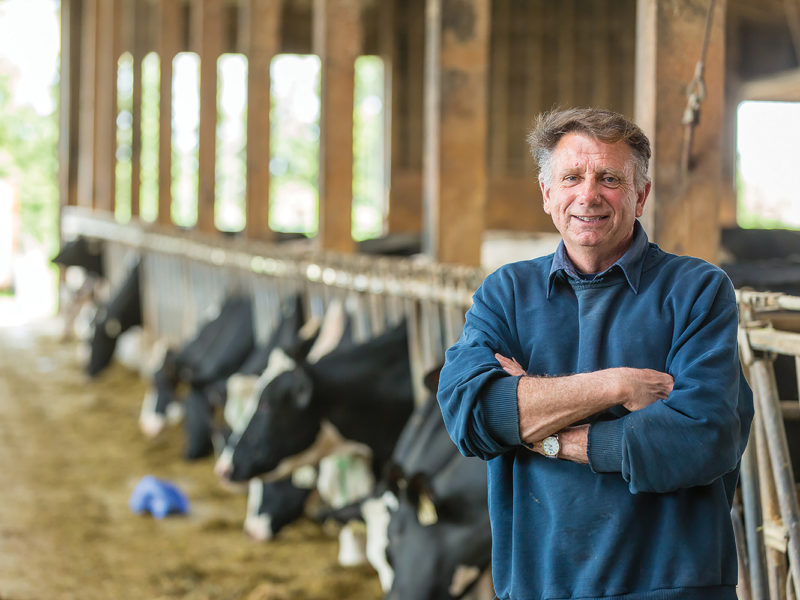DELTA – With BC working to reduce its use of fossil fuels, some farmers see renewable natural gas (RNG) as an opportunity to add a new income stream to their operations.
Seabreeze Farm owner and dairy farmer Jerry Keulen is among them. He was intrigued by the possibility of reducing his farm’s greenhouse gas emissions while upcycling the manure his cattle produce.
Unlike conventional natural gas, RNG is derived from biogas, which is the product of decomposing organic waste from landfills, agricultural waste and wastewater. Biogas is collected and cleaned to create RNG.
When ARDCorp put out a call for producers interested in RNG technology, Keulen agreed to participate in a feasibility study in 2010. The farm’s proximity to the energy grid and consumers made it an ideal spot to test out a new biogas project. Keulen decided to continue developing the project following the study and the complete waste management facility became operational in 2015.
“We were interested in RNG because the buzzword at the time was diversification, so we wanted to diversify with another income stream,” says Keulen.
The farm’s biogas is purified to pipeline quality natural gas and is then sold to FortisBC as RNG.
This renewable energy is different from the previous biogas options available to producers because it can feed into the existing natural gas distribution network, says FortisBC’s RNG supply manager Scott Gramm.
“You have the option to put it into the existing natural gas system,” he says. He notes that the price is often better than electricity. “Options of the past were to directly use raw biogas to burn for heat or potentially generate electricity. In our program, we offer a fairly high price for this source of energy that we can use to displace conventional gas.”
Keulen feeds his anaerobic digester with the manure from his 400-head milking herd and organics from off-farm sources, including oils and grease from restaurants across Metro Vancouver.
In total, Seabreeze Farms produces 45,000 gigajoules of RNG – enough energy to heat 500 homes for a year.
In addition to Seabreeze Farms Ltd. in Delta, FortisBC works with local suppliers including the Surrey Biofuel Facility as well as landfills in Kelowna and Salmon Arm. FortisBC has also signed a
20-year contract with EverGen, a publicly listed RNG infrastructure platform headquartered in Vancouver. As one of its largest customers, FortisBC will buy up to 173,000 gigajules of RNG annually from EverGen.
FortisBC does not have a minimum production threshold for farms supplying it with RNG, but Gramm says the economics have to make sense.
“My experience tells me that you want to be in the range of at least 200 milking cows plus some other organics to make the economics go round,” he says.
A farm that isn’t producing enough waste on its own can partner with neighbouring farms to produce the tens of thousands of tonnes of waste needed to feed the RNG system each year.
Farmers are responsible for installing the required RNG infrastructure on their properties and then FortisBC offers long-term contracts to farmers.
“You don’t need to go season-to-season but rather you can sign 10-to-20-year agreements,” he says.
At Seabreeze Farms, the byproducts from the RNG process include hygienic bedding for the cattle and a nutrient-rich digestate that can be used as fertilizer.
“Because we’re bringing in more nutrients and off-farm products onto ag land, the ministry of ag was concerned about how we were going to handle more nutrients on land that already has a lot of phosphorus,” says Keulen. “So, we now do a whole nutrient extraction. We collect all those nutrients, put them into a tight package and that allows us to move them off farm in a practical way to other land bases that need nutrients and spread those nutrients over a larger area.”
Those with RNG facilities on their farms need an approved nutrient management plan.
The project does not come without potential challenges, though.
Challenges
“There is a fair amount of work involved. We tried to run it alongside the farm the first five and half years,” says Keulen. “But we recently realized it’s a much bigger task, so we have a plant manager now who has taken over the daily operations. You can’t just turn on a switch and away you go.”
In addition, location is a determining factor in project viability.
“If you want to put renewable natural gas into the existing natural gas system, you have to have natural gas close to your farm,” says Gramm. “Sometimes that is a challenge for producers who have large properties and the gas line is far away. It can make the economics a little more challenging.”
Through all the lessons learned since they started the project in 2010, Seabreeze is excited about the technology’s contributions to a decarbonized economy.
“Collecting methane, the RNG program and putting nutrients into a tight package – there are a lot of really good aspects to it. I think they can work together perfectly and there have been a lot of new developments and technologies,” Keulen says.
After six years in operation, “we are no less excited about the potential of how RNG can work for us as dairy farmers and what the future holds.”
Producers who are interested in RNG projects on their farms can visit FortisBC’s online supplier guide and the Canadian Biogas Association’s website, which has a farm-to-fuel guide on biogas projects.


 Farmers take issue with water restrictions
Farmers take issue with water restrictions